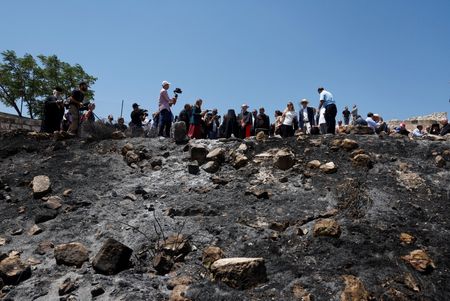LONDON (Reuters) -A BBC documentary about children’s lives in Gaza narrated by the 13-year-old son of a deputy agriculture minister in the Hamas-run government breached the British public broadcaster’s editorial guidelines on accuracy, an internal review said on Monday.
The BBC’s investigation, however, found there were no other breaches of its editorial guidelines, including on impartiality, and no evidence that outside interests “inappropriately impacted on the programme”.
The BBC removed “Gaza: How To Survive A War Zone” from its online platform in February, five days after it was broadcast, saying it had “serious flaws”. The documentary was made by independent production company HOYO Films.
A review found the programme breached a guideline on accuracy that deals with misleading audiences.
The background on the narrator’s father was “critical information” that was not shared with the BBC before broadcast, the review found.
Britain’s media regulator Ofcom launched its own probe after examining the BBC’s findings, stating on X that it would investigate under a rule requiring factual programmes to not “materially mislead the audience”.
Gaza’s health ministry says more than 58,000 people have been killed since the start of the war on Oct. 7, 2023, when Hamas-led militants stormed into Israel, killing about 1,200 people and taking 251 hostages into Gaza.
The BBC’s coverage of the war has been closely scrutinised throughout the conflict, with both supporters of Israel and its critics saying the broadcaster had failed to strike the right balance.
“Regardless of how the significance or otherwise of the Narrator’s father’s position was judged, the audience should have been informed about this,” said the report by Peter Johnston, BBC Director of Editorial Complaints and Reviews.
BBC Director-General Tim Davie said the report had identified a significant failing in relation to accuracy.
“We will now take action on two fronts – fair, clear and appropriate actions to ensure proper accountability and the immediate implementation of steps to prevent such errors being repeated,” Davie said in a statement.
(Reporting by Paul Sandle;Additional reporting by Muvija M;Editing by Sachin Ravikumar and Hugh Lawson)










